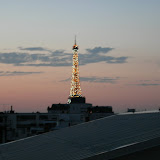A friend of mine last night asked me to explain what the scientist who just won the noble price in medicine did, and why it is so important, he mentioned it had something to do with DNA. At the time I had not heard about it yet, but I looked it up and found an article in the IHT telling about the medical repercussions of this technique as well as the adventurous story of the italian origins of one of the three.
The three scientists won the prize because they found a way of turning off ("knocking out") a specific gene in mice, any specific gene in fact, which has been very useful to study the function of the gene's product. This was especially useful because for a long time people thought that from one gene you get one product (a protein) which has a specific function. Very linear.
This is the idea, quite reductionist, that sold the human genome project: read the sequence, find the genes, find the cure.
The "knock out" experiments have shown that in reality this is true in only a few cases.
Most of the times "knocking off" one gene results in so many effects that it makes it difficult to pinpoint one specific function, this is because the gene's product interacts with so many other proteins in all kinds of cells, or because it is part of a chain reaction that can affect many different processes downstream. Other times the knockout has no effect at all, because our cells have a backup plan, in case anything goes wrong and they compensate, or because it is a gene that is used only under special, often stressful, occasions.
So these experiments have shown that things are not so linear after all, but a lot more complex, more of a network in fact, that is constantly changing with time.
At the end of the article the scientists are quoted as saying that at first their ideas were not accepted, and their grants were turned down because it was deemed an unfeasible project... five years later they finally got the grant, and five years after that everyone else was already using the technique. Now there are "mice banks" hosting up to 10,000 knockout mice !
Tuesday, October 09, 2007
Subscribe to:
Posts (Atom)



